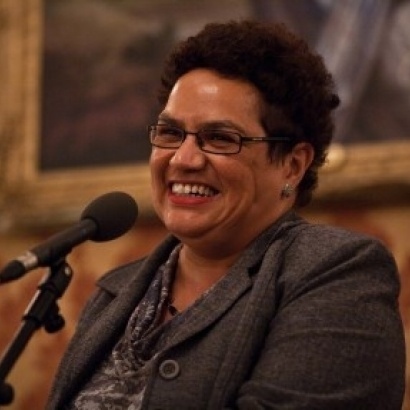 MLF Chapter & Verse
MLF Chapter & Verse
The Manchester Literature Festival Blog
Review: Jackie Kay and Adam Fairhall’s The Imaginary Delta
Festival Blogger Sarah Butler struggles to get into an unusual event that combines jazz and poetry, but finds that things warm up by the end…
I’m going to start with a caveat: whilst I grew up listening to jazz, I don’t really have the vocabulary to talk about it with much authority, so apologies up front. You should never start with an apology, I’ve been told that a hundred times, so I was surprised that Jackie Key, in her opening preamble, admitted that she’d rather be in the audience of Matt and Phreds than on the stage. Perhaps that added to my feeling that she wasn’t entirely comfortable for the first half or so of the performance, which began with a sequence of her poems about blues singer Bessie Smith, before moving on to a short newly commissioned piece: The Imagined Road. Or maybe it was me who wasn’t entirely comfortable (my chair had a broken back, I was tired) and had to get into the flow of things.
Either way, I found the first poems difficult to connect to; rather than a collaboration it felt like a slightly uneasy bringing together of existing text and music – Kay reading a couple of lines, waiting for the trombone, trumpet, bass clarinet to do its thing, then reading a couple lines more. For me, this meant I lost the meaning of the poem and the rhythm of Kay’s words. I started thinking about the difference between finely honed poetry and the improvisation (within a framework) of jazz and wondering if that was why it wasn’t working for me. I’ve heard Kay read numerous times and love her open-heartedness, her voice, the pace and rhythm of her work, but in these early poems the music felt more like an interruption than anything else (although I did love how the poems cast their meaning onto the purely instrumental pieces that punctuated the readings).
Things started to take off for me when Kay read a beautifully angry piece imagining Bessie Smith’s violent male partners all buried in the same graveyard. This time Kay was accompanied/counter-pointed by double bass and drums, and for me it was the first time the words and the music really connected. Maybe, I wondered – listening to the next piece, which combined words and piano, again beautifully – it was something to do with the choice of instruments: the brass/woodwind pieces felt too much like competing voices for me; maybe it was Kay really getting into her stride, holding her own as a member of a jazz group; maybe it was that these later poems were filled with anger and energy, had more repetition and a different rhythm that seemed to connect more authentically with the music, so that the last piece, which told the story of Smith confronting Klu-Klux Klan members and involved the whole ensemble, was truly moving.
It’s also possible that my growing enjoyment came from relaxing into the space and the atmosphere and the music, and learning how to listen.
_
Sarah Butler explores the relationship between writing and place through prose, poetry and participatory projects. She has been writer-in-residence on the Central line and at Great Ormond Street Hospital. Her debut novel, Ten Things I’ve Learnt About Love,was published by Picador in 2013. Her second novel, Before The Fire, is due out in Spring 2015. www.sarahbutler.org.uk / www.urbanwords.org.uk.
